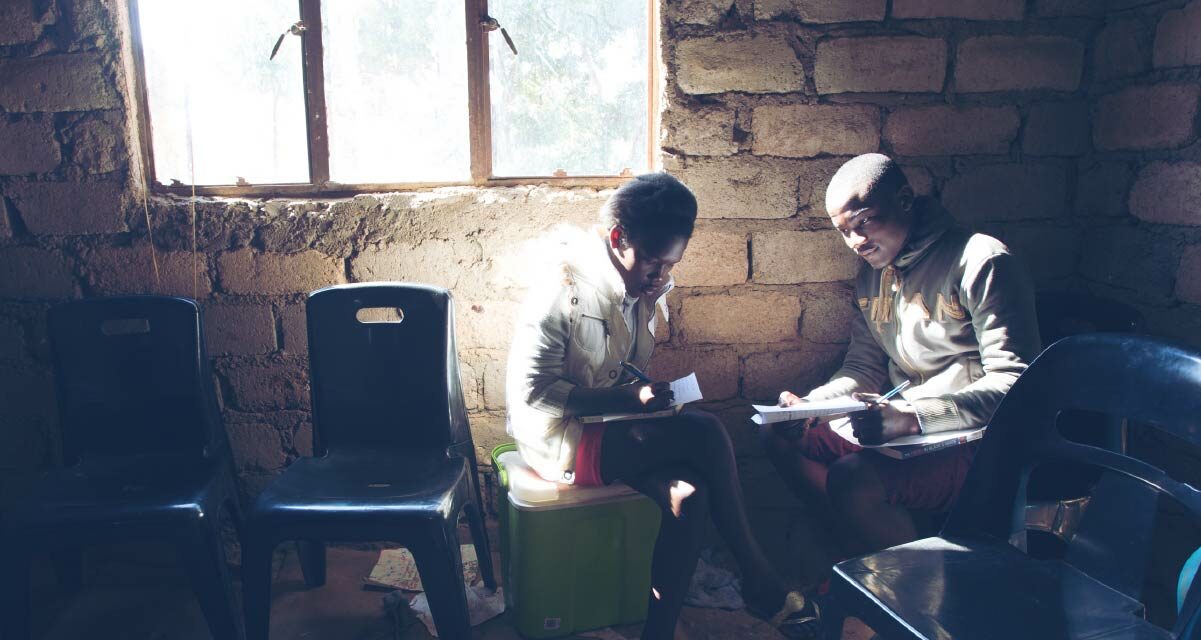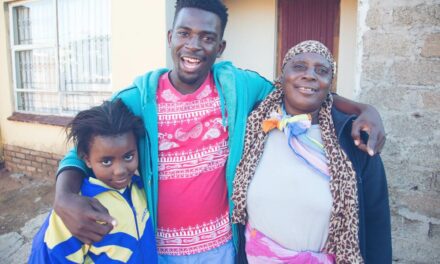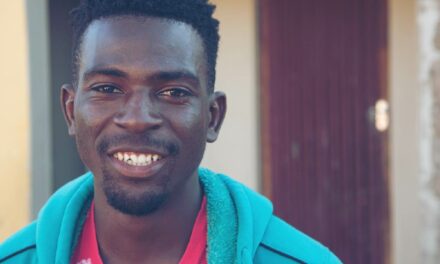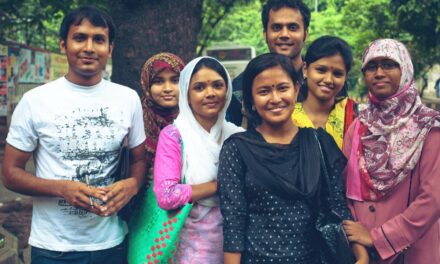InnerCHANGE approach to ministry is primarily expressed in deeds. One of the missions of the church is to be a tangible sign of the good news of the gospel in a particular context. History shows us that throughout the ages, the church of Jesus-Christ has normally understood the transformation of society through tangible acts of service as an essential part of its task. All InnerCHANGE teams serve vulnerable communities in ways that can be seen, heard and handled. InnerCHANGE’s focus on the ministry of deeds is how it aligns itself with the above-mentioned mission of the church. The InnerCHANGE team in South Africa is an example of such focus.
In its early days, the InnerCHANGE South Africa staff went around asking a lot of questions to neighbours and church leaders in order to learn what it meant to serve relevantly. It was in talking to its neighbours that the team learned about the need for a home-based health care service to take care of many who were terminally ill and bedridden. These patients were living in their homes and their primary caregivers were family members without any sort of healthcare training. There was an existing home-based care service that was a non-profit organisation (NPO) that the community knew very little about. When the team visited this NPO, it learned that it badly needed a nurse. This was a need that connected nicely with one of the InnerCHANGE South Africa staff’s calling. She was a nurse who felt called to serve the vulnerable with her skills. She joined the NPO where she started to serve her sick neighbours while also training many caregivers to take good care of their neighbours who needed palliative care. The team also started a bible study that many of the caregivers attended to start or improve their relationship with God. This also became a means to learn why InnerCHANGE conducts itself the way it does.
The nurse also loved little kids. The latter were the first neighbours to welcome the team’s founding family when they moved to their new home in the neighbourhood. These neighbourhood kids were curious about their new peers, the Kabongo children, and they came to visit them regularly since it was the school holidays. Through that opportunity to be surrounded by love bundles, the team started a kids’ club where baking and bible stories formed the activities of the program.
Through this same process of reading the community, the team connected with an orphanage where another team member started mentoring boy teenagers. This relationship led to starting a basketball team that included orphans and teenagers from the local community. This InnerCHANGE team member grew up playing basketball and used the skills he acquired to start the team basketball ministry.
These initial actions of the South African team are an example of the practical way in which InnerCHANGE seeks to practically love their neighbour and impact their community for good. This is a tangible way to join God in what He is doing in a local community. In InnerCHANGE, we believe that Jesus moved and still moves into the world in our different contexts to reveal Himself. Since God has been with us from the beginning of time, we, as members of the Body of Christ, the church, need to be tangibly present with our neighbours. As the church incarnates itself into a community, it becomes one of the people of that community. The Body of Christ enters into the life of the community and partners with the community in addressing its needs. With such an approach, the church has an opportunity to create a healthy platform to engage the people of that community and to remain an active listener in order to remain a relevant messenger of the good news of the gospel. This approach shows respect for the residents of the community in which InnerCHANGE serves because it honours them as people with great potential and wisdom. It also positions the church to join with the people in dealing with those issues or needs that they have identified as their own.
Hence, InnerCHANGE teams use the principles of an asset-based community development approach as a way to address the felt needs of a community and to demonstrate the love of Christ for the whole person. It stresses that true ministry to a community is a shared experience; it is teamwork between ministers and neighbours. The goal of this partnership should be to uplift the community and remind neighbours that they are the most precious assets in their own community. In the foreword of the book Sub-Merge, John M. Perkins captures this conviction very well in quoting this Chinese poem that challenges people being called to incarnationally minister to go to the people, live among them, learn from them, love them, start with what they know, build on what they have, but of the best leaders, when their work is finished, their task is done, the people will remark, we have done it ourselves (Hayes 2006:11).
This goal can only be reached if InnerCHANGE members prioritize the empowerment of the people they are building relationships with. InnerCHANGE believes that relationship building and healthy partnership with local community members are a great recipe for community development. For community builders who focus on assets in the community, rebuilding these local relationships offers the most promising route towards successful community development. The assets within under-resourced communities are necessary but usually not sufficient to meet the huge development challenges ahead. Teams are encouraged to adopt strong neighbourhood-rooted community organising, community economic development and neighbourhood planning. The goal is to see people who are poor, oppressed, outcast and/or living in under-resourced communities find their voice in order to see their communities become what they envision, rather than what those outside of their community want. It is argued that no society can be transformed until the vulnerable can address the needs of their context. Hence, unless people living with poverty can find ways to effect an economic, social and political redistribution of power, all the efforts to feed, house and clothe them can only be palliative measures that will never significantly change their estate. The task of people living with poverty, is their own empowerment. And the task of the church is to come alongside the people who are poor, both becoming their advocates before the rich and joining with the marginalised in their struggle to deal with the forces that are exploiting their community. The most effective means for facilitating this empowerment is through community organisation.
For the South Africa team, practical ministries have also become fertile ground for the discipling of neighbours into becoming obedient followers of Jesus. The team always incorporates bible study or stories into its practical ministries. Different approaches to bible studies have been used at different seasons. Discipleship is not only an organisational task or mandate, it is also how the team foresees sustainability. Through discipleship, the team tries to raise good news agents. It understands them as followers of Jesus who seek the peace and prosperity of their context in tangible ways and invite other people to do the same. As a result, the quality of life of those in the community can be improved, their lives can flourish and their communities can be rebuilt from the inside out. This vision of raising good news agents has challenged the team to disciple its neighbours with the hope that some of them will increase its (team growth) capacity to serve broadly and deeply. And many more of these neighbours will be a tangible sign of the good news of the gospel in their spheres of influence. This is why the team prioritises inviting people to join the family of followers of Jesus as well as deepening the believers’ obedience and dependence on Jesus throughout all its practical ministries. It believes that the most effective means for empowerment is to spur a community of disciple onto good news agency. In this approach, the team has also witnessed the development of followers of Jesus who influence other people to follow Jesus so that the good news of the gospel can be heard, seen and experienced. It has also seen the formation of contextual expressions of the body of Christ. the team hopes to sustain these expressions of the body of Christ as they arise and are formed.
Through the team’s practical ministry initiatives, they discover people who express a hunger to learn about Jesus more than others. This expression of hunger is usually a sign of a person of peace. The team has learned to invite such people to further conversations and opportunities to learn about Jesus. The team has seen better fruit when they develop and nurture several people than when they find only one person and allow them to independently run the show. It is within this group of people of peace that the team recruits leaders for its practical ministry initiatives and for staff.
This approach to ministry is a process with challenges along the way. The InnerCHANGE South Africa team has been facing the challenges below:
Deconstruction: Missionaries are known (mostly westerners) are providers of goods and services. And the local community residents are just passive recipients of these goods and services. The team has grappled with the difficulty of introducing itself as a group of people striving to become neighbours and partners in participating in improving the quality of life in its context. It tries to deconstruct the existing perception of missionaries and construct a new image that is local or national, ordinary and interested in fusing biblical values/principles to the daily aspirations of local communities.
Support from the local body of Christ. The local body of Christ does not seem to value community development. There seems to be a general sentiment within it that personal salvation would result in community transformation. In reality, it is sometimes true and most of the time, not true. Therefore, the InnerCHANGE team prioritization of community-based practical ministries has not received the tangible support of many local churches, only a few.
Model. As a missional team, the team strives to collaborate with the body of Christ in its diversity as well as non-believers. This is an unknown model in the context because local churches seem to only do intra-denominational collaborations. Also, the prioritisation of community-based discipleship with a bias towards those who are not believers yet is an unknown model which is sometimes frowned upon by many church leaders serving in the context.
Time: The momentum building is slow. It takes a long time to deconstruct a certain mentality. It also takes time for a new approach to ministry to be appreciated objectively. As a result, the team has learned to encourage long term commitments of its members and to frown upon the short term recruitment of people, especially relocators. As a consequence, the team is not multi-racial. It aspires to become a holy spirited community. The team understands the latter as a multi-cultural and multi-racial team working towards the common goal of making disciples of Jesus among the poor and developing local leaders. This understanding is interpreted from Acts 2:1-12. In this passage, one of the manifestations of the Holy Spirit was the evidence of multilingualism and multiculturalism among the disciples of Jesus.
Below are two testimonies (one of a woman and one of a man) of the efforts of the team to serve practically, disciple and develop leadership of disciple-makers.
Testimonies
Number one
It fills me with joy to share with you what God is been doing through me. My name is Moipone Sebatjane. I have been on staff with InnerCHANGE since 2017. However, I first got connected with InnerCHANGE in 2009 when as a middle school learner, I met Luc then who had started to coach a basketball team at our school. I joined the team, but dropped out of it after 2 sessions. Soon after that, I went to Luc’s house with few of my friends for a bible study they hosted every Tuesday evening. On our team, I get to lead and disciple children, teenagers, and young adults through a reading club, kids’ club, and teenager hangout.
In the reading club, our aim is to cultivate an appetite for reading in children (age group 5-9). Each year, I come across challenges of reading and writing literacy from both the children and the tutors. This reality confirms the necessity of our program in my community.
At Kids’ Club, we get to interact with the bible in different ways: through movies, songs, dance, games, and creative art. I like Kids’ Club because it is a different expression of the church. It teaches children about God in ways that make sense to them. I love seeing children have fun and learn at the same time. This is a program that is a need in my community because the church predominantly has a very conservative and non-child-centred approach to doing church. I also get very energised by playing with children. In fact, I am furthering my studies in early childhood education. The kids’ and reading clubs also provide me with a critical platform for experiential learning and mentoring of our volunteers. My experience with kids’ club has also prepared me to a children’s church at a nearby government children’s home which is a shelter for hundreds of vulnerable children. I started a children’s church there last year. I had a group of 18 children. Some of them were discharged from the centre early this year. I had mixed fillings about that: I was happy to see some of them go to new families; I was also sad to see them go. I still miss them, but happy that our communities are becoming good places where children can be raised and functional families be established. Now I have a group of seven, which consists of three girls and four boys ages 6-9. I have a heart connection with them because I come from a dysfunctional family and was orphaned at the age of 9 when my single mother passed away. However, God has protected and sustained me through the care of many people. Ministering to these children’s home reminds me of my childhood. I would love to remember it well so that I can meaningfully point the children I serve to Jesus as their pillar of strength. They humble me. Sometimes, I wish I could make them mine. I love them, and there is a song they love which says: ‘nothing secret is hidden from you, oh Father forgive them. All those who do me wrong are known to you. Oh Father forgive them’. May you pray for these little angels. Most of them have special needs.
At the teenager hangout, we try to provide a platform where teenagers can be discipled into followers of Jesus in ways which are fun, educational and interactive. Our team has seen a multiplication of these groups over the past few years. I lead one of the groups.
It is humbling and challenging to be a prophet at home. Jesus himself acknowledged this challenge in the bible (Matthew 13:57). This is something that someone can definitely not do well without prayer and a supportive team. I appreciate you for being one of our supportive teams. It is an honour to partner with you in Christ.
Number two
I am 26 years old. I met InnerCHANGE through Luc in 2008 at our school when I joined the basketball team he started. As part of the team, I learned a lot of things. From being a player to a better human being. It is also through basketball that I joined the band of followers of Jesus. Once a week, we were put in small groups in order to do discovery bible studies. The latter made me fall in love with Jesus. This love was solidified by my former mentor Oupa Manganyi who was on staff with InnerCHANGE. I was part of the first apprenticeship the team started in 2016 and got to learn a lot from Oupa. As an apprentice, I became one of the basketball coaches. Today, I am the coordinator of all the sport codes the team runs. I gather children from different schools through all of these initiatives. As with all IC initiatives, these are primarily discipleship programs. The challenges that I come across do not have to do with the sport itself, but with basic life issues. A lot of the kids I work with have a history of abuse, neglect and have thus grown resentful and angry. Sometimes they have questions that I don’t have answers for. I also learn a lot from them. The biggest of those lessons being patience.
In all our activities, we can attest to the fact that sport is a good community mobilization tool. However, our biggest challenge is the issue of parent involvement. Parents don’t seem to be supportive of their children and we feel like this hinders the growth and development of children somehow. They hardly attend the parent’s meetings we call. Drawing from my experience as a basketball player, sport in general is a good way to shape character and we hope to achieve the same with the kids who are part of our programs. We choose sport because we want to disciple children and the whole family through this medium.
With our volleyball ministry, our aim in different from the other codes. Here, we aim to reach out to a group that lives on the margins of our neighbourhoods. These are young adults’ men and women who are addicted to different substances. We meet on Thursdays and we encourage the lads to be present to their addiction and look for ways we can support each other on this journey. Through volleyball, we want to help the people who are using substances to let go of the lives they are living, lives of substance abuse and addiction. I have learned that drugs are not good for a person’s health through the guys we meet up with every Thursdays. I would like to see people living on the margins of society such as children and substance abusers move to the centre and become agents of their own hope and of the kind of society they would love to become. I feel like InnerCHANGE has helped me move from the margins to the centre as a coach and sport coordinator. I lost my father at a very young age and my mother when I was 19 years old. I was a high school dropout when she passed away. I would love to see many of my neighbours move from the margins to the centre so that together we can participate in building our township and South Africa as a country. Through sport I get to witness stories of hope emerge and Jesus be glorified as the inspiration of these stories of hope.
These testimonies are stories that the South Africa team strives to generate as it incarnationally serves in its contexts.
Reflection questions
- What community-building assets do you have in your context?
- How do you engage the culture of your context in a way that is meaningful to your neighbours?
- What discipleship approaches are applicable in your context?
- How have you seen leadership development happen in your context?
- How is God leading you to develop in your context?




